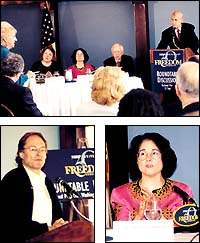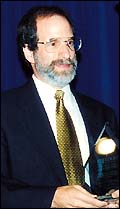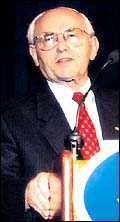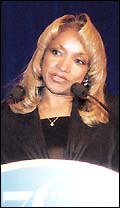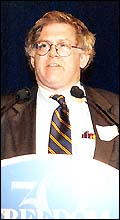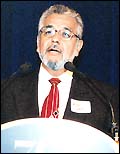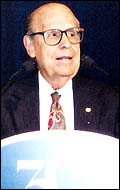
|


Events forward human rights causes and honor those who lead them

s part of Freedom’s mission to advance fundamental rights and freedoms, the editors initiated a feature in the magazine in 1987 to acknowledge leaders in the field of human rights. Through the years, Freedom’s Human Rights Leadership Profiles have highlighted the exemplary and sometimes extraordinary work and accomplishments of individuals.
The first Freedom Human Rights Leadership Awards event was held in Los Angeles in 1989. The award is presented to individuals in the forefront of efforts to advance the cause of freedom of expression, freedom of information, government reform, mental health reform, children’s rights, religious freedom and social justice.
Through awards to those who are improving conditions in society, positive contributions to our civilization and to the welfare of mankind are acknowledged.
The following pages feature men and women who received awards at Freedom’s 30th anniversary at the National Press Club in Washington, D.C.
Judge Charles B. Schudson
On the front lines in the battle to protect the rights of children, women, and the elderly in our courts, Judge Charles B. Schudson has had an impressive career.
After graduating from Dartmouth College, Phi Beta Kappa, he received a degree from Wisconsin Law School and was selected for a Fulbright Fellowship. He had the sort of background that spells success in just about any lucrative endeavor. But Judge Schudson’s concerns went in another direction.
He served as a state and federal prosecutor for seven years, and in 1975 developed the nation’s first battered women’s program in a prosecutor’s office. This ground-breaking and often-imitated effort led to an appearance on “The McNeil-Lehrer Report” and to the presentation of a paper to the U.S. Commission on Civil Rights, entitled “The Criminal Justice System as Family: Trying the Impossible for Battered Women.”
From 1976 to 1982, Judge Schudson directed precedent-setting prosecutions of nursing home patient abuses and Medicaid fraud. His efforts made their way to the pages of Newsweek and he received the U.S. Justice Department’s Award for Superior Performance.
Over the next 10 years, Judge Schudson served the Wisconsin Circuit Court in the juvenile and criminal courts of Milwaukee County. While so serving, he developed techniques to assist child victims and witnesses, and co-authored On Trial: America’s Courts and Their Treatment of Sexually Abused Children. The book has become a definitive text for training judges and other professionals in the justice system, and it has been provided to each justice on the U.S. Supreme Court. The Chicago Tribune called Judge Schudson “one of the few judges around the country at the forefront of the effort to ease the burden of child witnesses.”
He has additionally worked as an educator and served on the boards of the National Committee to Prevent Child Abuse, the National Resource Center on Child Sexual Abuse and the Child Protection Center of Children’s Hospital of Wisconsin.
Judge Schudson has served on the Wisconsin Court of Appeals since 1992.
Dr. Bert Beach
In Poland, Russia, Italy and the United States, Dr. Bert Beach has waged an ongoing battle on behalf of religious freedom.
His credentials as an educator represent the accomplishments of a lifetime, and most people could point to any one of them with great satisfaction: principal of the West Liberty Union Intermediate School in California; principal of the Italian Junior College in Florence, Italy; chairman of the History Department at Columbia Union College in Maryland and education director at St. Albans in England.
Dr. Beach, however, has another life’s worth of activities and accomplishments as a minister. He has served on the board of the Conference of Secretaries of Christian World Communions, as general secretary of the Council on Inter-Church Relations and as secretary general of the International Association for Religious Freedom. He has directed the public affairs of the General Conference of Seventh-day Adventists.
Currently president of the International Association for Religious Freedom, he is also a member of the Supreme Council of the Seventh-day Adventist Church.
A tireless campaigner for the right to worship as each person sees fit, he traveled to Poland at the invitation of the Polish Association for Religious Freedom. There, Dr. Beach was received by President Aleksander Kwasniewski and lobbied for religious freedom and equal status for all churches in Poland. His efforts, and those of his fellows guaranteed that the new Polish constitution was compatible with the standards of democratic states. Through the International Religious Liberty Association, as that organization’s secretary general, he has similarly fought in Russia for the right to worship freely.
Ernestine Peters
When the National Association for the Advancement of Colored People was founded in 1909, its purpose was to prevent organized violence against blacks and obtain the passage of anti-lynching laws. As times have changed, the NAACP has shifted its focus to seeking equal treatment in the press, the courts, the schools, and the minds and hearts of America.
While growing up in profoundly segregated Memphis, Ernestine Barlow Peters knew firsthand the need for the NAACP. One of 10 children in a poor family, she attended a segregated school and knew empirically the definition of “discrimination.” She was still a child when she realized segregation was neither natural nor necessary. At a young age, she began her efforts on behalf of the NAACP.
Her work today includes the nationally televised Awards, among whose 1998 honorees were composer and producer Kenneth “Babyface” Edmonds, director Stanley Kramer, actor Dijmon Hounsou, actress Vanessa Williams and U.S. Secretary of Labor Alexis Herman.
Peters created the NAACP Affirmative Action and Diversity Career Convention, otherwise known as the NAACP Job Fair, now in its 11th year. Corporate sponsorship provides job seekers interview opportunities with the Los Angeles Police Department, DreamWorks Studios, Enterprise Rent-A-Car, Los Angeles Unified School District, Aerospace Corporation, Media One, Sony Pictures and other employers. The Job Fair provides the open door to job and career opportunities.
Peters conceived and coordinated many such projects—all while also running two NAACP regional districts that encompass 16 states and two foreign countries.
She has been unceasing in her efforts to secure equal rights and equal opportunity for all people.
James H. Lesar
The Freedom of Information Act has been praised as one of the most powerful tools ever placed into the hands of the people of a nation seeking to ensure the integrity of their government. Originally passed into law in 1966, the act provides that any person can request access to any records of the executive branch of the federal government, and that those records, generally, must be released.
James H. Lesar is one of those who has pursued and utilized the FOIA for the benefit of all Americans.
A graduate of the Wisconsin School of Law, and practicing attorney in Washington, D.C., he is perhaps the only attorney in private practice to devote the majority of his efforts to the FOIA. He has litigated well over 100 FOIA cases in federal courts and his efforts have resulted in more than 45 published decisions helping to define the law of the land in favor of the people and their right to know.
In approximately 50 such cases, Lesar represented clients seeking information on the assassinations of President John F. Kennedy, Senator Robert F. Kennedy, and Rev. Dr. Martin Luther King Jr. His work was instrumental in the release of more than 750,000 pages of records pertaining to the JFK assassination. In one of his many triumphs, a trial he litigated resulted in the release of Warren Commission Executive Session records from January 1964.
Senator John Glenn invited Lesar to testify before the Senate Governmental Affairs Committee regarding legislation intended to bring about the release of virtually all the records pertaining to the assassination of President Kennedy. He so testified, as he has before many such committees.
Lesar also served as co-counsel representing the late James Earl Ray, alleged assassin of Dr. King, in his attempt—sanctioned by the King family—to overturn his guilty plea and reopen the question of who actually murdered the civil rights leader.
Lesar co-founded and now serves as president of the Assassination Archives and Records Center, a nonprofit organization that collects, preserves and disseminates information on political assassinations.
Judge Rudolph A. Diaz
and
Judge Stephen Marcus
Judge Rudolph (“Rudy”) Diaz and Judge Stephen Marcus have spent their adult lives in the legal arena, upholding not just the letter of the law, but its spirit. As judges, respectively, of the Rio Hondo and Los Angeles Muncipal Courts, they have defined justice not as an act of socially sanctioned revenge or punishment, but rather as those Judge Rudolph (“Rudy”) Diaz and Judge Stephen Marcus have spent their adult lives in the legal arena, upholding not just the letter of the law, but its spirit. As judges, respectively, of the Rio Hondo and Los Angeles Muncipal Courts, they have defined justice not as an act of socially sanctioned revenge or punishment, but rather as those
Never satisfied to merely issue judgments, both judges’ interests lie in the communities that generate the crimes they review each day. And realizing that imprisoning a drug addict does not solve drug addiction and its many attendant problems, both judges became instrumental in bringing Drug Courts to Los Angeles for drug-related and drug-addicted offenders.
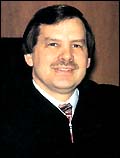
|
To finish the Drug Court program, one must completely come off drugs. The program includes court monitoring, drug testing five times a week and counseling. The offender must test drug-free for six months before graduating. As related to Freedom by Judge Diaz, the cost of this program yearly per person is $1,200, compared to the $25,000 or more it costs to keep that same person in prison—where the drug problem not only remains unresolved but often becomes worse.
As described in literature published by the Rio Hondo Drug Court, “Drug Court philosophy recognizes the optimum time for intervention and treatment is when the defendant is most highly motivated, i.e., when in custody or facing a state prison sentence. By securing the defendant’s release from custody, and insisting on an immediate treatment plan ... the program can achieve a period of sobriety and stabilization from which the defendant can begin the long-term process of treatment for the self-destructive tendencies of drug abuse, and for improving the defendant’s self-esteem.”
Judge Marcus described the concept to Freedom as “tough love"—the individual is compelled to undergo treatment in his own best interests. “The Drug Court judge must be part big brother, cheerleader and taskmaster,” he stated.
Through their efforts, Judges Diaz and Marcus are improving the lives of those who come before them and of the community at large by removing addicts and returning rehabilitated and useful individuals—taking steps to facilitate the end of the drug problem, one victim at a time.
Professor James Wood
The relationships between the state and its many churches are controversial and complex. Coming to a real understanding of this interface and educating others about it has occupied a well-spent life by Professor James E. Wood, Jr.
From 1973 to 1980, Wood served as the director of the Baptist Joint Committee on Public Affairs in Washington, D.C. His achievements with this committee are notable and his works prodigious, but they represent only a fraction of his accomplishments.
Dr. Wood has served as the director of the J.M. Dawson Institute of Church-State Studies at Baylor University throughout most of the life of that organization. Under Professor Wood’s guidance since 1957, the J.M. Dawson Institute has become internationally renowned, particularly for five of its programs:
1) a graduate program in Church-State Studies, leading to an M.A. or Ph.D.; 2) a Church-State Research Center, a specialized library of more than 13,000 books, 7,000 bound periodicals, and other archival and documentary materials relating to church-state and religious liberty issues throughout the world; 3) the publication of more than 20 books, and since 1959, The Journal of Church and State—still the only scholarly periodical devoted strictly to church-state issues; 4) the annual sponsorship of lectures, symposia, and conferences on church-state issues and 5) the Center for Constitutional Studies, which focuses on constitutional issues arising out of the First Amendment.
Dr. Wood has personally authored 15 books and contributed to 25 other volumes in the field of church-state relations. He is the author of an additional 200 articles in various journals and has lectured on church-state relations and religious liberty at more than 50 colleges and universities in the United States and in 16 other nations. He has served on numerous national and international human rights and religious liberty organizations and has been recognized for his tireless efforts to educate and to provide clarity and intelligence in the ongoing debate to preserve and promote religious freedom.
|

|


